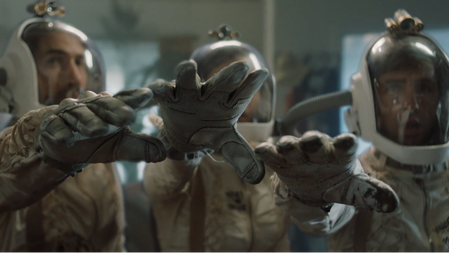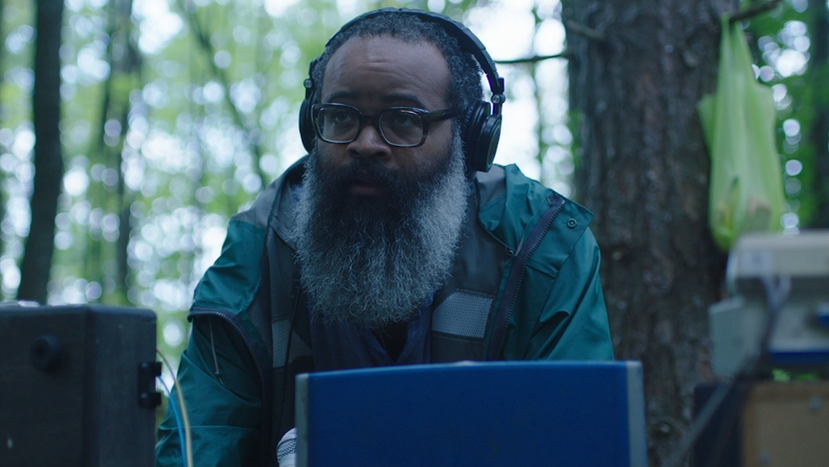 What do we do when we’re invited to confront our trauma?... ...Rage, grief, shame, fear. While some of us are eager to sort through the psychological perils of being human, others lose themselves in the darkness and never find a way out. The sci-fi thriller Doors, created by Saman Kesh and Chris White, is an anthological journey documenting the arrival of mysterious alien “doors” that appear in random locations all over the world. Each short film in Doors explores the mystery of the doors and the emotions and choices of its lead characters—choices that bring these characters face to face with their deepest, darkest feelings. This painful and poetic theme keeps the narrative alive throughout periods of plot confusion and disjointed storytelling. At times, Doors leaves much to be deduced by the audience. This can be frustrating, but for some of us, riddles and inferences add to the depth of the moviegoing experience. Doors clocks in at 81 minutes, which seems like a short timeframe to tell one cohesive story in a few short segments. The dots are difficult to connect aside from mysteries the audience is likely intended to ponder. Some segments are much stronger than others in terms of clarity and consistency. Individual character choices are sometimes questionable when compared to realistic responses. Despite these stumbles, Doors is a unique film that takes its audience down an introspective path. It features a talented and inclusive cast, beautiful cinematography, and atmospheric tension woven throughout each story. In the opening segment, “Lockdown” (written and directed by Jeff Desom), the audience is introduced to the initial appearance of the doors and how they interact with human subjects. High school student Ash (Kathy Khanh) and his peers are first to experience the arrival of the doors during detention. “Lockdown” is important as an introduction to the film’s main plot, but its underlying tone and emotion take center stage. We assume the story takes place during after school detention (Ash’s “fuck everyone” shirt probably didn’t sit well with the staff). The film implies that Ash is gender nonbinary or transgender. Ash corrects one of his peers for purposefully misgendering him during a debate among the students on whether to enter the hallway where a door has emerged. Ash's discomfort and ostracism manifest in his interactions with the door, particularly in the way the door “talks” to Ash. “Lockdown” uses on-screen text to convey a telepathic conversation between the door and Ash. The door pulsates like a sea of iron shavings against a twirling magnet as it tells Ash to strike his classmate. Ash’s physical struggle with his classmate and internal emotional struggle are reflected in the door’s jagged, sudden movements. “Lockdown” differs from the other segments largely in a tone of urgency against a muted black and grey background. Character choices feel out of touch with what you would expect teenagers to do when faced with a creepy, pulsating portal. But overall, “Lockdown” is a strong lead-in supported by a group of talented young actors. “Knockers” (written and directed by Saman Kesh) is the strongest but most chaotic and confusing segment of the film. Undoubtedly, viewers are going to be lost here even though there is a brief overlay of a radio segment that describes current events in a little detail. Teams of researchers, named (for better or worse) “knockers”, enter the doors and record their findings on the other side. Each knocker can only enter a door for a short period of time before their sanity is in jeopardy. “Knockers” opens with Becky (Lina Esco - S.W.A.T., Kingdom) and Vince (Josh Peck - Fuller House, Drake & Josh) standing together on a beach, both wearing pseudo spacesuits. Becky recites a haunting poem that somewhat foreshadows events to come. Slow and melancholic, this opening scene contrasts the tone of the remainder of the segment. Becky, Vince, and Ricky (Wilson Bethel - Daredevil, How to Get Away with Murder) enter a portal in a forest near the beach. Each character faces unique challenges on the other side of the door. Subsequent scenes echo past events that the viewer isn’t fully introduced to but can deduce with clues in the form of flashbacks and snippets of conversation. Throughout the flashbacks, it is unclear which happened, and which are only figments of door-melted minds. “Knockers” is tonally much different from the other segments. Morphing background items and frantic camera panning overlap. Bright pink roses against a pink background in several of Ricky’s scenes is markedly different from “Lockdown”’s angry, grey palette. Becky goes head-to-head with grief. Grief that ultimately stems from loss of self and autonomy. “Knockers” poses the question: are we all living on this planet with intent—or are we simply here, letting things happen to us? Esco and Peck give A-list performances where you wouldn’t expect to find them. If nothing else, take with you the emotional interaction between the two. “Lamaj” (written and directed by Dugan O’Neal) retreats into the mountains where scientist Jamal (Kyp Malone) lives alone in a forest cabin. He’s discovered a door, and rather than turning it in to local authorities for quarantine and research, has decided to research it himself. In this act, we get a little more of a glimpse into the purpose of the doors, though much is still up to personal interpretation. Jamal invites a former colleague and love interest to “meet” the door, whom he has started recording conversations with. It is her introduction that describes why Jamal is living a secluded life after being cast out of the scientific community for his outlandish ideas. Jamal is faced with this embarrassing reminder and the chance at redemption (and the implied hopes of winning back his former beaux) if he can be the first person to communicate with a door. “Lamaj”’s screenplay isn’t as strong as in “Lockdown” and “Knockers”. Uncovering the purpose of the doors is the true draw for the audience here. After “Lamaj” (and between each segment) are radio show host Martin Midnight’s (David Hemphill) brief transition segments. Doors uses these radio clips to help explain the doors’ effects on mankind. Midnight’s on-camera interview with Alan (Darius Levanté) offers further explanations for the doors’ arrival. Alan’s psyche has been tampered with during an interaction with a door. He has a newfound understanding of the doors' purpose and of humanity’s collective new charge to embrace the doors’ arrival. The scene between Martin and Alan is reminiscent of VHS’s many “what the hell” moments in which you aren’t sure if you want to keep watching because you feel a little disturbed, but you can’t peel your eyes from the screen. Levanté’s performance is engaging, eliciting uncomfortable chuckles and a few chin-scratchers. Opposite “Lamaj”, this exchange lacks plot but lives solely on description through bizarre conversation and interaction between two characters who carry the audience to the credits. Mind-bending and beautifully filmed, Doors is often the melding of fragmented poetry. Though it sometimes borders on erratic, Doors maintains a steady pace that will captivate diehard science fiction and independent film fans. Doors is on VOD now from Epic Pictures By Amy Cerkas Celebrate Women in Horror Month with us by donating to Cinefemme at: Donate (cinefemme.net)
0 Comments
Leave a Reply. |
Archives
March 2023
|


 RSS Feed
RSS Feed